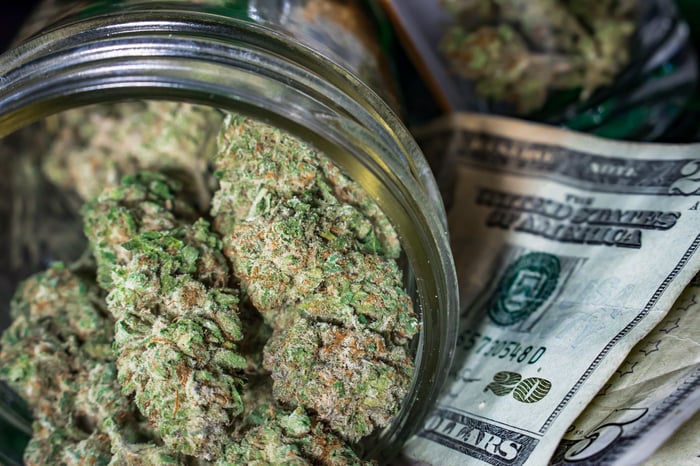In many ways, this is the year that the marijuana industry had always hoped for. In October, Canada ended nine decades of recreational weed prohibition and opened its doors to adult-use sales. Even though it'll take time for the industry to get fully up to speed, the Canadian legal pot industry should have an opportunity to generate in the neighborhood of $5 billion in added annual sales by the early portion of the next decade.
We witnessed plenty of success in the U.S. market, too, despite the federal government holding firm on its scheduling of cannabis. Two new states (Missouri and Utah) legalized medical cannabis, with two more states (Vermont and Michigan) giving recreational marijuana the green light. All told, 32 states have approved medical pot, 10 of which also allow adult-use weed.

Image source: Getty Images.
Pot stock investors had a miserable year
However, a perfect year it was not for investors in marijuana stocks. In fact, it just about couldn't have gone any worse. The most-followed cannabis ETF, the Horizons Marijuana Life Sciences ETF, shed about 45% of its value since the year began. Considering that it was actually up on a year-to-date basis by 8% in mid-October, the drop over the past two-plus months has been brutal.
There are no shortage of reasons for Wall Street and investors to be skeptical of pot stocks heading into the new year. More than half of all Canadian provinces are experiencing a supply shortage that probably won't correct in the upcoming year. Between growers needing to complete their expansion projects and Health Canada drowning in cultivation license applications and sales permit applications, there doesn't appear to be an easy way to fix the country's supply issues.
The marijuana industry also didn't do much to inspire confidence following the latest round of earnings results. Even though recreational sales aren't included in the newest earnings reports, the gist is that pot stocks are losing a lot of money right now without the aid of one-time benefits and fair-value adjustments on biological assets.
But the biggest knock of all against the marijuana industry in 2018 might just be share-based dilution.

Image source: Getty Images.
Irrefutable evidence of what share-based dilution did to investors in 2018
As a refresher, pot stocks haven't had easy access to non-dilutive financing options, such as a line of credit or loan. In the U.S., that's because most financial institutions fear criminal or financial penalties associated with providing financial services to the cannabis industry. But even in Canada, where recreational marijuana is now legal, banks haven't exactly stepped up in a big way. Without much help in the financing department, marijuana stocks have been left with one surefire way to raise capital: bought-deal offerings.
A bought-deal offering involves the sale of common stock, convertible debentures, stock options, and/or warrants to an investor or group of investors in order to raise capital. This money is used for capacity expansion, branding, marketing, the push into international markets, and even acquisitions. But bought-deal offerings have a downside. As a company's share count rises, it weighs on the value of existing shareholders and can lower earnings per share.
Some folks overlook the role share-based dilution plays since raising cash or making an acquisition "adds value." But as we look back on the marijuana industry in 2018, it's undeniable the role share-based dilution has played in crushing investors' hopes and dreams.
On the basis of market cap (not share price), here's how some of the top marijuana stocks performed this year (through Dec. 23, 2018):
- Aurora Cannabis (ACB -1.86%): up 52%
- Canopy Growth (CGC -3.13%): up 102.7%
- Auxly Cannabis Group (CBWTF -12.90%): up 5.8%
Now, here's how those same marijuana stocks performed solely on the basis of share price over the same time frame:
- Aurora Cannabis: down 36%
- Canopy Growth: up 10.8%
- Auxly Cannabis Group: minus 65.4%
Comparing the two, here's the amount of underperformance caused by share-based dilution, rounded to the nearest whole number:
- Aurora Cannabis: 88 percentage points
- Canopy Growth: 92 percentage points
- Auxly Cannabis Group: 71 percentage points

Image source: Getty Images.
These are huge underperformances! Sure, Canopy Growth bucked the downtrend and ended higher for the year, but the combination of relying on its common stock for acquisitions, and issuing shares to Constellation Brands, which took a 37% equity stake in Canopy Growth in mid-August for $4 billion, wrecked its year.
Aurora Cannabis wasn't far behind in the underperformance department. Even though its three completed acquisitions and leading peak production potential are being factored into the company's market cap, Aurora's growth-at-any-cost strategy has absolutely ballooned its outstanding share count. By perhaps as soon as the next quarter, Aurora Cannabis could have more than 1 billion shares outstanding. This means it'll need to earn 100 million Canadian dollars just to generate CA$0.10 in EPS, which is no easy task.
Auxly Cannabis, which is possibly best known for its royalty partnership with other growers, hasn't been generating any positive cash flow from operations as of yet. This has meant Auxly has had to turn to bought-deal offerings on a regular basis to fund its upstream, midstream, and downstream cannabis partnerships and acquisitions.
In other words, until we see banks step up and offer nondilutive financing options, and marijuana stocks begin to generate positive operating cash flow, there's liable to be a reliance on share issuances to raise capital and close acquisitions. That's not good news, as you can see from the stock performances above.





